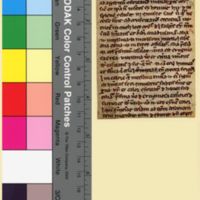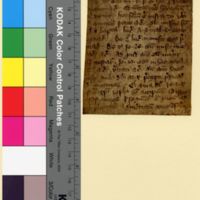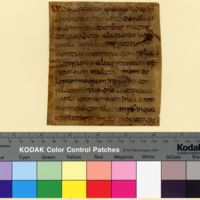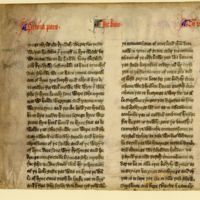Fragmenta Manuscripta
Philosophy and Theology
Religion not only motivated the production of liturgical and devotional books, but also great works of theological and philosophical thinking. Medieval philosophy refers to four main traditions: Byzantine (Christian), the “Latin” West (Christian), Jewish, and Islamic.The terms philosophers, theologians, thinkers, and intellectuals are often used interchangeably to discuss the medieval authors who dealt with existential questions. The first medieval Christian authors took the works of the great pagan Greek and Roman philosophers and reinvented them within a Christian worldview. The resulting philosophy found God as the source of everything in the universe.
The foundations of the first universities in the twelfth century and the translations of many of Aristotle’s works into Latin for the first time were part of the renewal that later scholars used to dub these hundred years as the Twelfth Century Renaissance. Intellectuals like Thomas Aquinas used Aristotelian logic in a method of teaching and learning known as scholasticism to blend human reason with Christian faith.
There was a shift in thinking around the middle of the fourteenth century, owed in part to the catastrophic effects of the Great Plague of 1347-1353 (now popularly referred to as the Black Death). The focus of intellectual thought was now given to blind faith rather than reason.
Medieval philosophers wrote a lot of works to share their interpretation of ancient texts and their vision of the creation of the universe. They had followers and opponents who also wrote works in agreement or disagreement with their teachers.
Fragmenta Manuscripta includes fragments from philosophical texts with known and unknown authors. The items from the collection are included below. Click on the names of any single author to learn more about them.
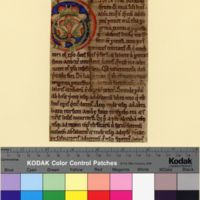
Fragmenta Manuscripta 009
Date: 1150-1199
Contents: De civitate Dei
Language: Latin
Location: England

Identifier: Fragmenta Manuscripta 069
Date: 1300-1350
Content: Treatise on logic
Language: Latin
Location: England
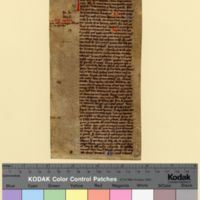
Identifier: Fragmenta Manuscripta 070
Date: 1200-1225
Contents: Dialogues, Book IV, chapter 37-38
Language: Latin
Location: England
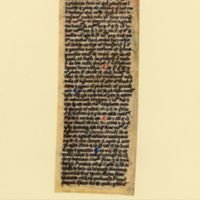
Identifier: Fragmenta Manuscripta 072
Date: 1290-1310
Contents: Thomas Aquinas, Summa theologiae
Language: Latin
Location: France (?)
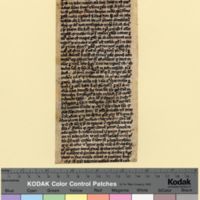
Identifier: Fragmenta Manuscripta 073
Date: 1285-1299
Contents: Philosophical text
Language: Latin
Location: England
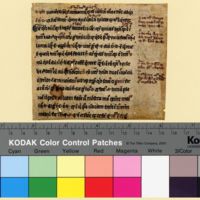
Identifier: Fragmenta Manuscripta 085
Date: 1290-1310
Contents: Treatise on Logic
Language: Latin
Location: England

Identifier: Fragmenta Manuscripta 127
Date: 1300-1399
Contents: Philosophical text
Language: Latin
Location: England
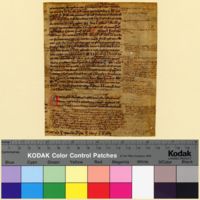
Identifier: Fragmenta Manuscripta 136
Date: 1250-1299
Contents: Philosophical text
Language: Latin
Location: England

Identifier: Fragmenta Manuscripta 141
Date: 1290-1310
Contents: Philosophical text
Language: Latin
Location: England

Identifier: Fragmenta Manuscripta 143
Date: 1300-1350
Contents: Philosophical text
Language: Latin
Location: England
Philosophical Texts
These examples from the colleciton include philosophical texts with unknown and known authors. For more on the known philosophical authors represented in the collection, see Aristotle, Augustine of Hippo, Gregory the Great, Thomas Aquinas.

Identifier: Fragmenta Manuscripta 191
Date: 1400-1499
Contents: Death of the Blessed Virgin Mary
Language: Latin
Location: France
Featured Theological Text: The Death of the Virgin
The Virgin Mary was one of the most popular of all saints in the medieval period. By the thirteenth century, she had her own cult following in Europe, with many cathedrals founded in the name of “our lady” or notre dame. Although the New Testament provided an account of her life, it did not provide the details of her death. Theologians turned to the available information in the New Testament and wrote their own interpretations of Scripture. Theologians wrote about the Virgin’s Dormition, or sleep/death, and Assumption, her bodily ascent to heaven. They had differing opinions on whether Mary died before her Assumption, whether her body was taken into Heaven or if it was only her soul, and where on Earth she spent her last moments.
The Fragmenta Manuscripta collection includes two manuscript leaves with accounts of the Death of the Virgin (FM 191-192).

Identifier: Fragmenta Manuscripta 006
Date: 1250-1299
Contents: De fide catholica ex veteri
Language: Latin
Location: England
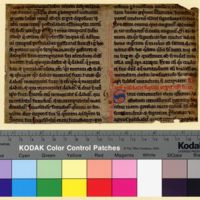
Identifier: Fragmenta Manuscripta 047
Date: 1240-1260
Contents: De sacramentis christianae fidei
Language: Latin
Location: England

Identifier: Fragmenta Manuscripta 065
Date: 1250-1299
Contents: De poenitentia
Language: Latin
Location: France?
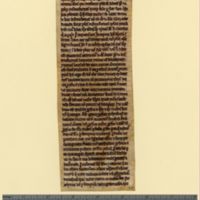
Identifier: Fragmenta Manuscripta 066
Date: 1200-1250
Contents: Sententiarum libri
Language: Latin
Location: England

Identifier: Fragmenta Manuscripta 087
Date: 1200-1250
Contents: Sententiarum libri
Language: Latin
Location: England?

Identifier: Fragmenta Manuscripta 132
Date: 1250-1299
Contents: Ecclesiastical text
Language: Latin
Location: England
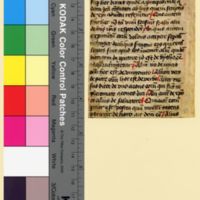
Identifier: Fragmenta Manuscripta 187
Date: 1440-1460
Contents: Theological text
Language: Latin
Location: England
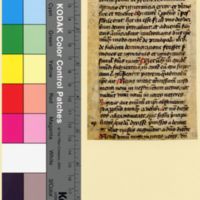
Identifier: Fragmenta manuscripta 186
Date: 1440-1460
Contents: Theological text
Language: Latin
Location: England
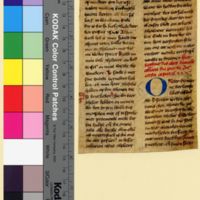
Identifier: Fragmenta Manuscripta 189
Date: 1400-1499
Contents: Conferences
Language: Dutch
Location: Low Countries
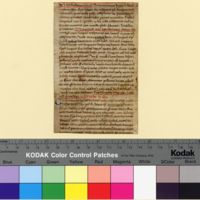
Identifier: Fragmenta Manuscripta 075
Date: 1200-1299
Contents: Moralia in Job
Language: Latin
Location: England?
Theological Fragments
These examples from the collection are classified as theological fragments—some have known authors and others do not. These examples include commentaries on religious texts and explanations regarding the holy saints.
For known authors of theological fragments in the collection see Ambrose of Milan, Gregory the Great, Hugh of St. Victor, Isidore of Seville, Peter Lombard, Pseudo-Bonaventure and Ludolphus of Saxony.
BIBLIOGRAPHY
Daley, Brian E, S.J. ““At the Hour of Our Death”: Mary’s Dormition and Christian Dying in Late Patristic and Early Byzantine Literature.” Dumbarton Oaks Papers 55 (2001): 71-89.
Gracia, Jorge J.E. Gracia. “Philosophy in the Middle Ages: An Introduction.” In A Companion to Philosophy in the Middle Ages, ed. by Jorge J. E. Gracia and Timothy B. Noone. Malden, MA: Blackwell Publishing, Ltd, 2002.
Marenobon, John. Medieval Philosophy: An Historical and Philosophical Introduction. London: Routledge, 2007.
McNamer, Sarah. "The Origins of the Meditationes vitae Christi." Speculum. 84, issue 4 (2009): 905–955.
McNamer, Sarah. Meditations on the Life of Christ: The Short Italian Text. Notre Dame, Indiana: University of Notre Dame Press, 2018.
Shoemaker, Stephen J. Ancient Traditions of the Virgin Mary's Dormition and Assumption. Oxford University Press, 2002.
Shoemaker, Stephen J. Mary in Early Christian Faith and Devotion. New Haven: Yale University Press, 2016.
Spade, Paul Vincent. “Medieval Philosophy.” The Stanford Encyclopedia of Philosophy. Summer 2018 Edition. https://plato.stanford.edu/cgi-bin/encyclopedia/archinfo.cgi?entry=medieval-philosophy
Pasnau, Robert, and Christina van Dyke (eds.). The Cambridge History of Medieval Philosophy. Cambridge: Cambridge University Press, 2010.

